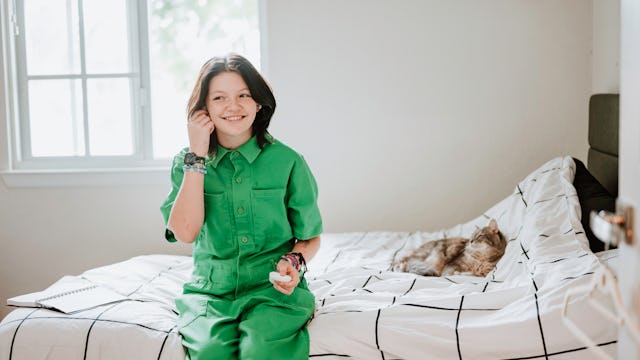Why Are Kids Choosing Objects As Their Genders?
Experts explain what xenogenders and nounself pronouns are, and offer advice for supporting your child’s identity.

It's super common to see pronouns listed like this: he/his, she/her, they/their. But occasionally, you might also find a list like this: he/him/bun/bunny. More than any other generation, Gen Z is broadening their view and challenging the traditional idea of gender. In fact, Time Magazine reported in 2023 that more than half of Gen Z-ers believe that there are more than two genders.
A gender that goes beyond the traditional binary of male and female is called "nonbinary." If you don't personally know someone who is nonbinary, you've probably noticed that some big-name celebrities — like Atypical star Brigette Lundy-Pain and The Last of Us star Bella Ramsey — have publicized their nonbinary identities.
Within the nonbinary community, there is a small percentage of people who are choosing to take gender outside of the human realm altogether. If you’re the parent of a child who falls within this percentage, you’re probably wondering how you can support your kid’s identity. I asked experts for insight and advice, and here’s what I learned.
What are xenogenders and neopronouns?
The xenogender label popped up on Tumblr about 10 years ago for people who describe their gender using plants, animals, creatures, and objects. This practice is accompanied by a separate but related one involving pronouns, with some kids and teens choosing to use "nounself" pronouns.
These pronouns, created using existing words or themes, might look like this: wol/wolf/wolfself or fae/faer/faeself or vamp/vampself.
According to research from The Trevor Project, the number of people using nounself pronouns is very small. They tend to pop up among intense fandoms, gaming communities, and neurodiverse youth. Some kids choose to use them only in certain contexts, such as online roleplay, or only with certain people, like friends or relatives.
Why do these pronouns appeal to young people?
Nounself pronouns might appeal to neurodivergent brains because they can have multiple thoughts at once, and they don't feel the same pressure as neurotypical people to follow societal norms. "To me, it makes perfect sense that folks with these kinds of brains are searching for ways to name themselves that better match the complexity and non-linearity of their thinking," says Jen Self, founder of the University of Washington Q Center and owner of Brick 13 consulting.
Choosing a nounself pronoun may reflect a child or teen's process of understanding their identity and gender through their interests, hobbies, and personality.
Still, articles from the New York Times and CNN about neopronouns or "new pronouns" have sparked criticism and debate on social media. Since nounself pronouns are used by only a small sliver of the population, they are hard for many people to understand and accept.
Although neopronouns are getting more attention recently, there's actually a long history behind them, according to Dennis Baron, author of What's Your Pronoun. The search for an "it" pronoun alternative that refers to people dates back hundreds of years. "They" has always been the most popular option.
"Not enough people use [neopronouns] to make a dent," Baron says. "They are there because we have a feeling that singular 'they' is not doing it. We're still looking for the perfect solution. My guess is that the singular 'they' will continue long-term. The others will come and go."
How can parents support their xenogender kids?
While the pronoun debate continues, parents and caregivers are left wondering what it actually means for their everyday lives.
There are several ways parents or caregivers can support a child who says they are xenogender or want to use nounself pronouns, explains Kelsey Pacha, owner of the consulting firm Infinite Diversity LLC and board president of Trans Bodies, Trans Selves.
"First, ask the child to share more about their identity, and second, communicate that you want to respect them," Pacha says. "Adults can ask directly, 'What should I call you?' and 'How can I best respect you?'"
Since some children and teens only use this part of their identity in certain contexts and with certain people, they might not want their xenogender or nounself pronoun to be discussed or used everywhere. Respecting their privacy is important.
Pacha says that since this language can be unfamiliar and uncomfortable to some people, it's helpful to say, "Using these words is new to me, and I might mess up. Please know I am always doing my best. Would it be OK for me to call you by your name as I learn?"
Parents of kids who identify as xenogender or use nounself pronouns may also want to look for youth groups and therapists that specialize in LGBTQ or neurodiverse youth.
"Although xenogender youth are not the same as transgender or nonbinary youth, these intersectional providers may have resources in your area that support a broader range of identities than we see in the dominant culture," Pacha says.